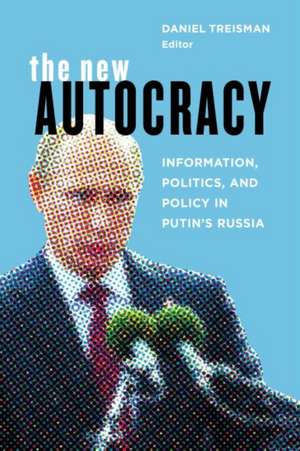New Autocracy
en Limba Engleză Paperback – 5 feb 2018
Corruption, fake news, and the "informational autocracy" sustaining Putin in power
After fading into the background for many years following the collapse of the Soviet Union, Russia suddenly has emerged as a new threat-at least in the minds of many Westerners. But Western assumptions about Russia, and in particular about political decision-making in Russia, tend to be out of date or just plain wrong.
Under the leadership of Vladimir Putin since 2000, Russia is neither a somewhat reduced version of the Soviet Union nor a classic police state. Corruption is prevalent at all levels of government and business, but Russia's leaders pursue broader and more complex goals than one would expect in a typical kleptocracy, such as those in many developing countries. Nor does Russia fit the standard political science model of a "competitive authoritarian" regime; its parliament, political parties, and other political bodies are neither fakes to fool the West nor forums for bargaining among the elites.
The result of a two-year collaboration between top Russian experts and Western political scholars, Autocracy explores the complex roles of Russia's presidency, security services, parliament, media and other actors. The authors argue that Putin has created an "informational autocracy," which relies more on media manipulation than on the comprehensive repression of traditional dictatorships. The fake news, hackers, and trolls that featured in Russia's foreign policy during the 2016 U.S. presidential election are also favored tools of Putin's domestic regime-along with internet restrictions, state television, and copious in-house surveys. While these tactics have been successful in the short run, the regime that depends on them already shows signs of age: over-centralization, a narrowing of information flows, and a reliance on informal fixers to bypass the bureaucracy. The regime's challenge will be to continue to block social modernization without undermining the leadership's own capabilities.
After fading into the background for many years following the collapse of the Soviet Union, Russia suddenly has emerged as a new threat-at least in the minds of many Westerners. But Western assumptions about Russia, and in particular about political decision-making in Russia, tend to be out of date or just plain wrong.
Under the leadership of Vladimir Putin since 2000, Russia is neither a somewhat reduced version of the Soviet Union nor a classic police state. Corruption is prevalent at all levels of government and business, but Russia's leaders pursue broader and more complex goals than one would expect in a typical kleptocracy, such as those in many developing countries. Nor does Russia fit the standard political science model of a "competitive authoritarian" regime; its parliament, political parties, and other political bodies are neither fakes to fool the West nor forums for bargaining among the elites.
The result of a two-year collaboration between top Russian experts and Western political scholars, Autocracy explores the complex roles of Russia's presidency, security services, parliament, media and other actors. The authors argue that Putin has created an "informational autocracy," which relies more on media manipulation than on the comprehensive repression of traditional dictatorships. The fake news, hackers, and trolls that featured in Russia's foreign policy during the 2016 U.S. presidential election are also favored tools of Putin's domestic regime-along with internet restrictions, state television, and copious in-house surveys. While these tactics have been successful in the short run, the regime that depends on them already shows signs of age: over-centralization, a narrowing of information flows, and a reliance on informal fixers to bypass the bureaucracy. The regime's challenge will be to continue to block social modernization without undermining the leadership's own capabilities.
Preț: 294.74 lei
Nou
Puncte Express: 442
Preț estimativ în valută:
56.41€ • 58.80$ • 46.96£
56.41€ • 58.80$ • 46.96£
Carte tipărită la comandă
Livrare economică 06-20 ianuarie 25
Preluare comenzi: 021 569.72.76
Specificații
ISBN-13: 9780815732433
ISBN-10: 0815732430
Pagini: 332
Dimensiuni: 152 x 229 x 20 mm
Greutate: 0.54 kg
Editura: Brookings Institution Press
ISBN-10: 0815732430
Pagini: 332
Dimensiuni: 152 x 229 x 20 mm
Greutate: 0.54 kg
Editura: Brookings Institution Press
Cuprins
"
Contents
Preface
1. Introduction: Rethinking Putin's Political OrderDaniel Treisman
2. Inside the Kremlin: The Presidency and Executive BranchMaxim Ananyev
3. Not Just a Rubber Stamp: Parliament and LawmakingBen Noble and Ekaterina Schulmann
4. The Siloviki in Russian PoliticsAndrei Soldatov and Michael Rochlitz
5. Regional Elites and MoscowNikolay Petrov and Eugenia Nazrullaeva
6. The Role of Business in Shaping Economic PolicyNatalia Lamberova and Konstantin Sonin
7. Media in Russia: Between Modernization and MonopolyMaria Lipman, Anna Kachkaeva, and Michael Poyker
8. Public Opinion and Russian PoliticsKirill Rogov and Maxim Ananyev
9. The Courts, Law Enforcement, and PoliticsElla Paneyakh and Dina Rosenberg
10. Civic and Political Activism in RussiaAnton Sobolev and Alexei Zakharov
11. Crimea: Anatomy of a DecisionDaniel Treisman
About the Contributors
Index
"Preface
1. Introduction: Rethinking Putin's Political OrderDaniel Treisman
2. Inside the Kremlin: The Presidency and Executive BranchMaxim Ananyev
3. Not Just a Rubber Stamp: Parliament and LawmakingBen Noble and Ekaterina Schulmann
4. The Siloviki in Russian PoliticsAndrei Soldatov and Michael Rochlitz
5. Regional Elites and MoscowNikolay Petrov and Eugenia Nazrullaeva
6. The Role of Business in Shaping Economic PolicyNatalia Lamberova and Konstantin Sonin
7. Media in Russia: Between Modernization and MonopolyMaria Lipman, Anna Kachkaeva, and Michael Poyker
8. Public Opinion and Russian PoliticsKirill Rogov and Maxim Ananyev
9. The Courts, Law Enforcement, and PoliticsElla Paneyakh and Dina Rosenberg
10. Civic and Political Activism in RussiaAnton Sobolev and Alexei Zakharov
11. Crimea: Anatomy of a DecisionDaniel Treisman
About the Contributors
Index
Descriere
The result of a two-year collaboration between Russian experts and Western political scholars, this volume explores the complex roles of Russia's presidency, security services, parliament, media and other actors. The authors argue that Putin has created an "informational autocracy," which relies more on media manipulation than on the comprehensive repression of traditional dictatorships.
